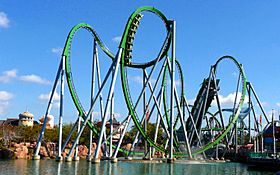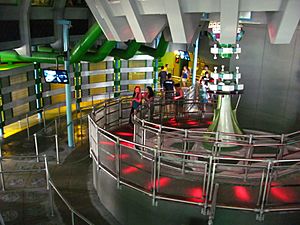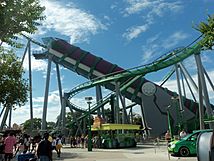The Incredible Hulk Coaster facts for kids
Quick facts for kids The Incredible Hulk Coaster |
|
|---|---|
 |
|

Attraction logo (2016-present) (top)
The Incredible Hulk in 2007 (bottom) |
|
| Universal Islands of Adventure | |
| Location | Universal Islands of Adventure |
| Park section | Marvel Super Hero Island |
| Coordinates | 28°28′16″N 81°28′06″W / 28.471168°N 81.468424°W |
| Status | Operating |
| Soft opening date | March 27, 1999 |
| Opening date | May 28, 1999 |
| General statistics | |
| Type | Steel – Launched |
| Manufacturer | Bolliger & Mabillard |
| Designer | Werner Stengel |
| Model | Sitting Coaster – Custom |
| Lift/launch system | Tire propelled launch |
| Height | 110 ft (34 m) |
| Drop | 104.9 ft (32.0 m) |
| Length | 3,700 ft (1,100 m) |
| Speed | 67 mph (108 km/h) |
| Inversions | 7 |
| Duration | 2:15 |
| Capacity | 1920 riders per hour |
| Acceleration | 0 to 40 mph (0 to 64 km/h) in 2 seconds |
| G-force | 4 |
| Height restriction | 54 in (137 cm) |
| Trains | 8 cars. Riders are arranged 4 across in a single row for a total of 32 riders per train. |
| Theme | Hulk |
|
|
|
|
|
|
|
|
|
| The Incredible Hulk Coaster at RCDB | |
The The Incredible Hulk Coaster is a super-fast launched roller coaster located at Universal Islands of Adventure theme park in Florida. Built by Bolliger & Mabillard (B&M) and designed by Werner Stengel, this exciting ride is themed after the awesome Hulk superhero from Marvel comics. It first opened on May 28, 1999.
This coaster was the first B&M roller coaster based on a Marvel superhero. It was also the first to use a special launch system, created by Universal Creative and MTS Systems Corporation. The launch system shoots riders from 0 to 40 miles per hour in just two seconds! The coaster eventually reaches a top speed of 67 miles per hour. It has seven upside-down loops and twists along its 3,670-foot track. The ride was very popular when it first opened.
The Incredible Hulk Coaster got a big update from September 2015 to August 2016. This included a new waiting area, an updated story, new track parts for a smoother ride, and new trains with cool on-board music.
Contents
History of the Hulk Coaster
Back in the early 1990s, Universal started planning a new theme park next to Universal Studios Florida. By 1993, they decided one part of this new park would be all about Marvel Comics, and the Hulk was chosen for an exciting roller coaster.
The designers wanted riders to feel like they were shot out of a cannon! So, Universal Creative and MTS Systems Corporation worked together to create a special launch system. They even had a working model by 1995.
Construction for Islands of Adventure began in 1997. The park, and The Incredible Hulk Coaster, officially opened on May 28, 1999.
On August 14, 2015, Universal announced a big update for the coaster. It closed on September 8, 2015, and reopened on August 4, 2016. This update brought a new story, a redesigned waiting area, and new track pieces for a smoother ride. The trains also got cool on-board music and special lights. The launch tunnel was repainted black.
In 2015, there were plans for a similar roller coaster at Universal Studios Beijing. However, in 2019, Universal announced that this new ride, called Decepticoaster, would be themed after the Transformers movies instead.
What Makes the Hulk Coaster Special?
The Incredible Hulk is a steel sitting coaster made by the Swiss company Bolliger & Mabillard (B&M). This 3,670-foot-long ride has seven inversions, which means you go upside down! These include a zero-G roll, a cobra roll, two vertical loops, and two corkscrews.
The ride reaches a height of 110 feet and has a first drop of 105 feet. You'll hit a top speed of 67 miles per hour on this ride, which lasts about two and a quarter minutes. Each train has eight cars, and four riders can sit side-by-side in each car. This means 32 people can ride at once. Riders must be at least 54 inches tall and are kept safe with over-the-shoulder restraints. The ride can carry up to 1,920 riders every hour. The coaster dives underground twice, goes over water, and glows green at night!
How the Launch System Works
A special launch system shoots riders up the 110-foot hill. Universal Creative and MTS Systems Corporation created this system. They even built a prototype in 1995, using welded boxcars and a dune buggy! The final system launches trains from 0 to 40 miles per hour in just 2 seconds. Riders zoom through a 150-foot tunnel at a 30-degree angle, feeling 1 G of force.
They looked at many ways to power the launch, like hydraulics and steam. They chose a 'drive tire' system. This uses 230 electric motors to power tires that grip the train and push it forward. Because this needs a lot of power (8 megawatts!), the park uses special generators with big flywheels to make sure the local power grid isn't affected each time a train launches.
For a long time, The Incredible Hulk was the only B&M coaster with a launch system. Then, Thunderbird opened at Holiday World in 2015, using a different type of launch called a linear synchronous motor (LSM).
Your Adventure on the Hulk Coaster
The Original Ride (1999–2015)
The Waiting Area
The waiting area looked like Dr. Bruce Banner's science lab. TVs showed cartoons about the Hulk's story, with characters like Bruce, General Thunderbolt Ross, and Betty Ross Banner. Dr. Banner was trying to reverse the gamma mutation, and guests were about to be part of his experiment! You could see parts of the roller coaster through holes in the walls and hear the screams as trains zoomed by.
The Ride Experience
After you boarded, the train entered a 'gamma-ray accelerator.' A recording of Dr. Bruce Banner would play, sounding nervous: "Everything looks good...I think...I think this time it's...going to work!" Then, a female voice warned, "Warning! Coolant levels dropping!" and announced a malfunction. Alarms blared, and Dr. Banner screamed, "No! No! No! No!" Just as he yelled the last "No!", the train launched from 0 to 40 mph in 2 seconds, shooting you out of the station!
Right after the launch, you went into a zero-G roll, flipping you upside down, then dropped 105 feet. The train hit 67 mph, then twisted through a cobra roll over the park's lagoon. Next was a vertical loop, followed by a misty underground tunnel. After exiting, the track circled the station, sending you through a corkscrew and a second vertical loop. The ride slowed down a bit, then you went through another corkscrew and a turn. The final part of the ride included a sideways tilt and a helix before reaching the end.
The Updated Ride (2016–Present)
The Waiting Area
After the 2016 update, the waiting area got a brand new story. Guests now enter a dangerous science experiment led by General Thaddeus Ross. The entrance has a cool statue of the Hulk holding a ride vehicle above his head, with coaster tracks curving over him. TVs now show computer-animated videos of people being exposed to gamma radiation and turning into Hulk-like creatures. Before you enter the main queue, you'll go through metal detectors and need to put all loose items in a locker.
The Ride Experience
The update added exciting new features, like a redesigned launch tunnel and speakers on every train playing music. After the waiting area, you reach General Ross's launch platform. Once you're on board, the train moves into a 'gamma core' area. As the train goes up the launch tunnel, a female voice says, "Initiating Gamma Exposure. Hulk Transformation: Accelerating. Do not be afraid." Lights and sounds show the gamma accelerator powering up, and then the launch system shoots you out of the tunnel! You'll experience the same thrilling track layout as before, but with new, smoother track pieces. An original song by Patrick Stump from Fall Out Boy plays through the speakers on your train.
 | Emma Amos |
 | Edward Mitchell Bannister |
 | Larry D. Alexander |
 | Ernie Barnes |



